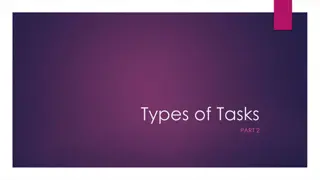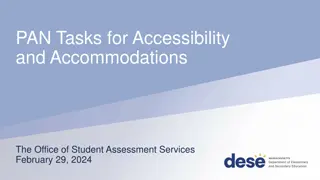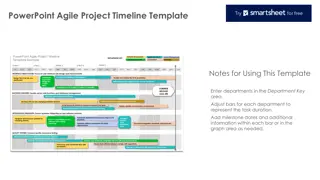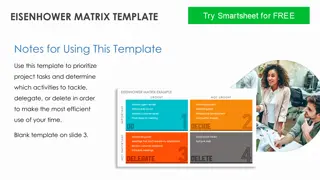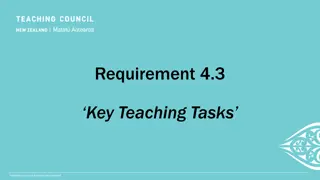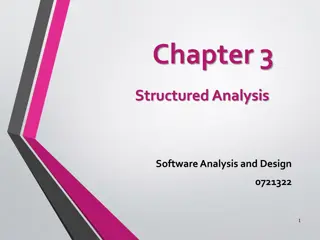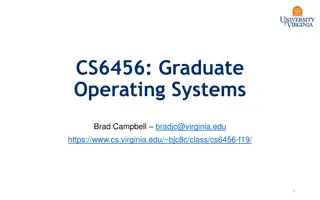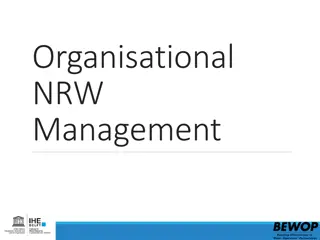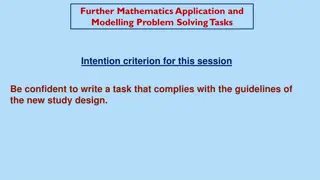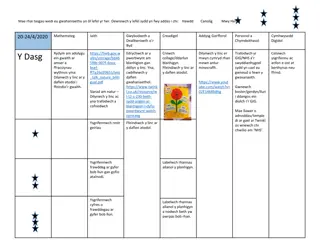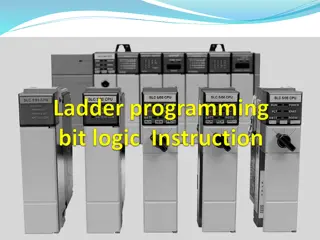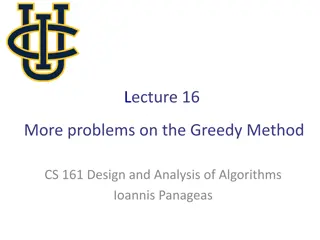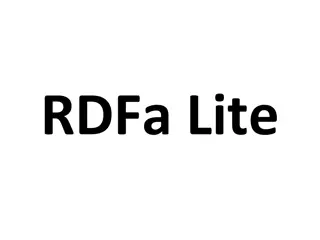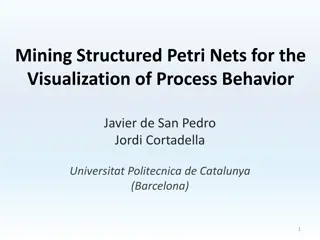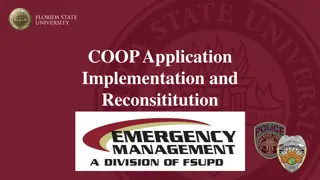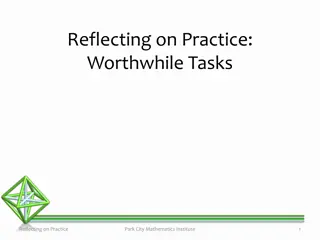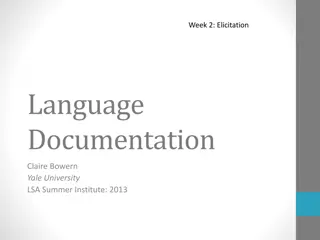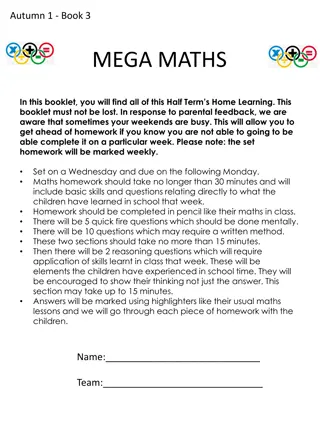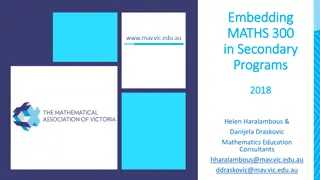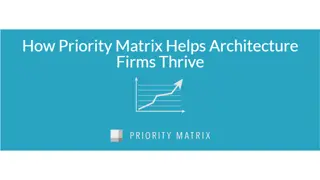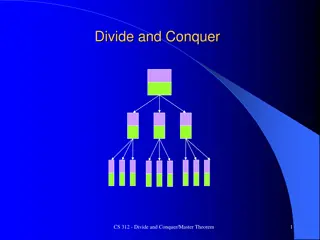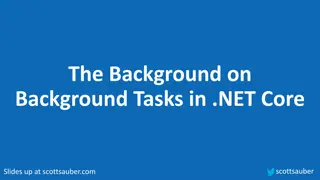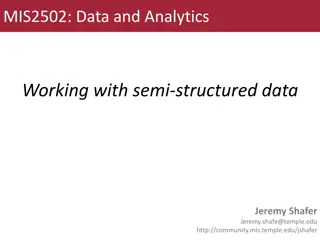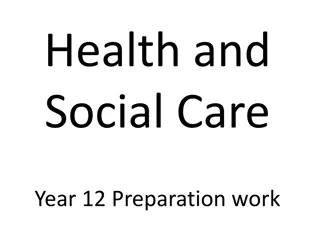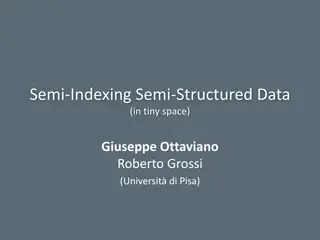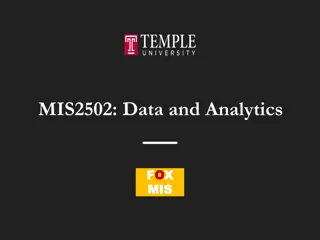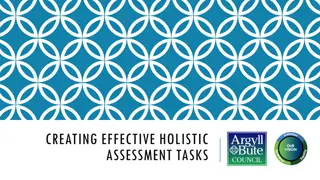Cognitive Load Classification with 2D-CNN Model in Mental Arithmetic Task
Cognitive load is crucial in assessing mental effort in tasks. This paper discusses using EEG signals and a 2D-CNN model to classify cognitive load during mental arithmetic tasks, aiming to optimize performance. EEG signals help evaluate mental workload, although they can be sensitive to noise. The
0 views • 19 slides
Understanding Types of Tasks in Language Learning
Explore different types of tasks in language learning, including real-life tasks, pedagogic tasks, input-based tasks, output-based tasks, unfocused tasks, and focused tasks. Discover the language skills involved, types of outcomes students need to produce, and examples of task classifications.
2 views • 13 slides
The Ins and Outs of School-Based Assessment in VCE Psychology
Assessment in VCE Psychology is essential for demonstrating satisfactory understanding of outcomes through tasks like School-Assessed Coursework (SACs) and exams. Teachers and schools must align tasks with the study design, VCAA principles, and ensure they are tailored to student needs. Satisfactory
3 views • 48 slides
PAN Tasks for Accessibility and Accommodations Training Session
Dive into the PAN tasks for accessibility and accommodations training session conducted by the Office of Student Assessment Services. Learn about the critical tasks to complete before testing, updating accommodations in PAN, web extensions, and available resources. Engage in live sandbox time and ga
4 views • 67 slides
Agile Project Timeline Template for Software Development Teams
This PowerPoint template provides a structured timeline for Agile project management, allowing teams to visualize and plan tasks across different departments. The template includes sections for departments, sprints, milestones, and specific tasks related to software development, quality assurance, o
0 views • 4 slides
Agile Project Timeline Template for Software Development Teams
This PowerPoint Agile Project Timeline Template Example showcases a structured approach to managing software development projects, with a focus on departments, sprints, milestones, and key tasks. The template offers a clear visual representation of tasks over time, allowing teams to track progress,
0 views • 4 slides
Objective Structured Clinical Examination (OSCE): A Modern Approach to Assessing Clinical Competence
The Objective Structured Clinical Examination (OSCE) is a modern examination method widely used in the field of health science to evaluate clinical skill performance. It involves stations where medical students interact with simulated patients to demonstrate competencies such as history taking, phys
1 views • 40 slides
Eisenhower Matrix for Efficient Task Prioritization
Use the Eisenhower Matrix template to effectively prioritize project tasks by distinguishing between urgent and important activities. Delegate, delete, or tackle tasks based on their significance for optimal time management. An example matrix provided showcases various tasks categorized as urgent/im
1 views • 4 slides
Key Teaching Tasks and Partnerships in Assessment Framework
The assessment framework for teacher training programs must include a set of 10-15 key teaching tasks that new teachers should be capable of performing on their first day on the job. These tasks need to align with teaching standards, be observable and measurable, and connect directly to working with
1 views • 13 slides
Enhancing Language Proficiency Through IPAs and Communicative Tasks
Explore the integration of Integrated Performance Assessments (IPAs) and Communicative Tasks in language teaching, focusing on building student proficiency in reading, listening, speaking, and writing. Discover practical tips for implementing and managing IPAs, along with engaging communicative task
1 views • 16 slides
Understanding Structured Analysis in Software Design
Structured analysis in software design aims to describe customer requirements, create a basis for software design, and define validatable requirements. Two main modeling philosophies, structured analysis, and object-oriented analysis are discussed. Structured Analysis Model Elements such as Data Flo
1 views • 44 slides
Understanding Real-Time Systems and Operating Systems
Real-time systems in computing refer to the concept of task execution meeting specific deadlines, with examples including process control in industrial plants, robotics, air traffic control, and more. Tasks in real-time systems have defined release, schedule, completion times, and deadlines, with ru
0 views • 46 slides
Effective Organisational Measures for NRW Management Teams
Implementing a structured approach to NRW management involves the establishment of a Steering Committee and Task Team. The Steering Committee oversees integration, decision-making, resource allocation, and accountability. The NRW Task Team, led by an experienced caretaker, defines tasks, creates con
0 views • 29 slides
Practical Application of Mathematics in Problem Solving
Enhance student assessment validity through School-assessed Coursework tasks that explore mathematical contexts deeply and creatively. Implement tasks over a continuous period emphasizing modeling, problem-solving, and technology use. Tasks should be practical with a focus on assumptions, definition
0 views • 36 slides
Differentiated Tasks for Learning - Week of 20-24/4/2020
Tasks for the week of 20-24/4/2020 include revising time and fractions, exploring nature through activities like plant collages and Minecraft Yoga, discussing the NHS, expressing gratitude, and enhancing knowledge in various subjects. Links and resources are provided for easy access to the tasks.
0 views • 4 slides
Introduction to Structured Text in PLC Programming
Structured text is a high-level text language used in PLC programming to implement complex procedures not easily expressed with graphical languages. It involves logical operations, ladder diagrams, and efficient control logic for industrial automation. Concepts such as sensor input, logic operation
5 views • 23 slides
Understanding Procrastination: Types and Strategies to Help Overcome It
Procrastination is the act of delaying tasks due to various reasons like fear of failure, lack of action, feeling overwhelmed, or being too busy. Different types of procrastinators include perfectionists, dreamers, overwhelmed avoiders, and busy bees. Strategies to tackle procrastination include vis
0 views • 6 slides
Training Scenario for Sustainment Brigade Deployment Preparation
Adapted training scenario for deploying a sustainment brigade featuring specific unit capabilities and planning tasks for Phase 0 deployment at Fort Hood, TX. Includes analyzing mission specifics, integrating religious support, and executing deployment tasks. Detailed overview of the Atropian scenar
9 views • 7 slides
Occupational Therapy Preceptorship Programme Overview and Response to COVID-19
This document outlines an Occupational Therapy Preceptorship Programme by N. Chappell, focusing on tasks and objectives for preceptees. It describes the annual fixed resource session at the University of Brighton, task categories, E-workbook usage, appraisal objectives, and monthly forums. Additiona
2 views • 4 slides
Greedy Method for Task Scheduling Problems
The greedy method is a powerful algorithm design technique used in solving various optimization problems. In the context of task scheduling, we explore two specific problems: minimizing the number of machines needed to complete all tasks and maximizing the number of non-overlapping intervals on a si
1 views • 58 slides
Understanding RDFa Lite: A Simplified Approach to Structured Data Markup
RDFa 1.1 Lite is a subset of RDFa 1.1 that simplifies structured data markup by employing attributes like vocab, typeof, property, resource, and prefix. It works seamlessly with schema.org terms, enabling easy integration of structured data into web content. The comparison of RDFa Lite with Microdat
2 views • 7 slides
Managing Multiple Priorities Amidst Chaos - Strategies for Success
Effective strategies for managing multiple priorities include maintaining a structured to-do list system, engaging regularly with Most Important Priorities (MIPs), and implementing weekly and daily tactical plans. Avoiding poorly defined tasks and utilizing external systems for tracking commitments
0 views • 29 slides
Visualization of Process Behavior Using Structured Petri Nets
Explore the concept of mining structured Petri nets for visualizing process behavior, distinguishing between overfitting and underfitting models, and proposing a method to extract structured slices from event logs. The approach involves constructing LTS from logs, synthesizing Petri nets, and presen
0 views • 26 slides
COOP Application Implementation & Reconstitution Guide
Detailed guide on implementing and reconstituting COOP applications, including assigning tasks, activating roles, managing alternate operations, and facilitating reconstitution. The process involves assigning tasks to individuals, maintaining operational continuity, and preparing for potential disru
0 views • 5 slides
Insights into Structured Reporting Practices in Colorectal Cancer Imaging
A survey conducted by Dr. Eric Loveday at North Bristol NHS Trust revealed the current landscape of structured reporting in MRI and CT scans for rectal and colon cancer. Results indicate a positive outlook towards implementing national standards for structured radiology reporting, with an emphasis o
0 views • 7 slides
Reflecting on Effective Math Tasks at Park City Mathematics Institute
Explore various math tasks presented at the Park City Mathematics Institute, focusing on promoting discussions and eliciting student understanding. Tasks are designed to encourage critical thinking and reasoning, emphasizing the importance of errors in learning opportunities. Participants engage in
2 views • 18 slides
Structured Elicitation Methods for Language Documentation
Explore various types of elicitation methods such as structured translation, grammaticality judgments, and picture identification tasks for language documentation. Learn how to design tests, conduct sessions, and analyze language outcomes effectively. Understand the importance of using appropriate v
0 views • 22 slides
Mega Maths Half-Term Home Learning for Autumn Term
In this Mega Maths booklet for Autumn Term, students are provided with structured homework sets that cater to parents' feedback regarding busy weekends. The homework consists of quick mental questions, written exercises, and reasoning tasks, each designed to reinforce in-class learning. Students are
0 views • 13 slides
Understanding Rich Tasks in Mathematics Education
Rich tasks in mathematics education are purposeful and engaging activities that encourage problem-solving, critical thinking, and collaboration among students. These tasks are designed to challenge learners at different levels, promote multiple solution strategies, and lead to meaningful learning ou
0 views • 20 slides
Embracing Secondary School: Weekly Tasks for Year 7 Students
As Year 7 students transition to secondary school, weekly tasks aim to build confidence, resilience, and a positive attitude. Tasks include unlocking the mind-set, addressing worries, and challenging self-limiting beliefs through a growth mindset. Encouraging students to develop a positive approach
0 views • 5 slides
Understanding Priority Matrix in Teams
Priority Matrix is a valuable tool in the A/C/E industry, allowing teams to prioritize tasks efficiently, communicate priorities effectively, and track progress accurately. Real teams benefit from its use cases in prioritization, communication, and progress tracking, creating a roadmap for workflow
0 views • 23 slides
Understanding the Divide and Conquer Technique in Computer Science
The Divide and Conquer approach is a powerful strategy used in computer science to break down large problems into smaller, more manageable subproblems. By recursively solving these subproblems and combining their results, this technique offers a structured way to tackle complex tasks efficiently. Th
1 views • 59 slides
Understanding Background Tasks in .NET Core
Explore the world of background tasks in .NET Core with this informative slideshow by scottsauber. Learn about various types of background tasks, suitable problems, available options like IHostedService, BackgroundService, Worker Service, Hangfire, and more. Discover how to choose the right option f
0 views • 41 slides
Understanding Semi-Structured Data in Data Analytics
Exploring the world of semi-structured data, we delve into its significance in data analysis. From relational databases to CSV files and Excel spreadsheets, learn about the various forms of data storage and organization. Discover the role of quotation marks, differences between structured, semi-stru
0 views • 19 slides
Comprehensive Health and Social Care Year 12 Preparation Tasks
This set of tasks aims to prepare students for Year 12 studies in Health and Social Care. Tasks include creating lists of settings and professions, crafting job adverts for healthcare and social care workers, researching and creating an academic poster on equality, diversity, and rights, visiting va
0 views • 8 slides
Energy-Efficient Illumination and Imaging Techniques for Structured Light Applications
This presentation at ACM SIGGRAPH 2015 by Utkarsh Sinha and Jenna Lake explores the use of homogeneous codes to optimize energy efficiency in structured light applications. The focus is on distinguishing between translucency and inter-reflections, removing artifacts, reconstructing 3D objects in cha
0 views • 34 slides
Semi-Indexing Semi-Structured Data in Tiny Space by Giuseppe Ottaviano and Roberto Grossi
This article discusses the concept of semi-indexing for semi-structured data in limited space, presented by Giuseppe Ottaviano and Roberto Grossi from the University of Pisa. The study explores efficient data organization techniques to optimize storage and access for structured information.
0 views • 19 slides
Understanding Data Structures and Formats in Analytics
Explore the various types of data structures, including structured, semi-structured, and unstructured data. Learn the role of relational databases and how data is stored differently. Delve into the significance of semi-structured and unstructured data in modern organizations.
0 views • 20 slides
Understanding Holistic Assessment Tasks in Education
Holistic assessment tasks in education aim to assess students' learning across various areas of development, incorporating higher-order thinking skills and application in real-world contexts. These tasks are used for pre-assessment, ongoing learning, and making professional judgments of achievement
0 views • 14 slides
Streamlining Milestone Award Tasks in Workday for Efficient Grant Management
Simplify the process of completing milestone award tasks in Workday by following step-by-step instructions. Learn how to navigate to award tasks, complete award tasks, and find valuable resources for grant management. Contact GCA for assistance when needed.
0 views • 6 slides

